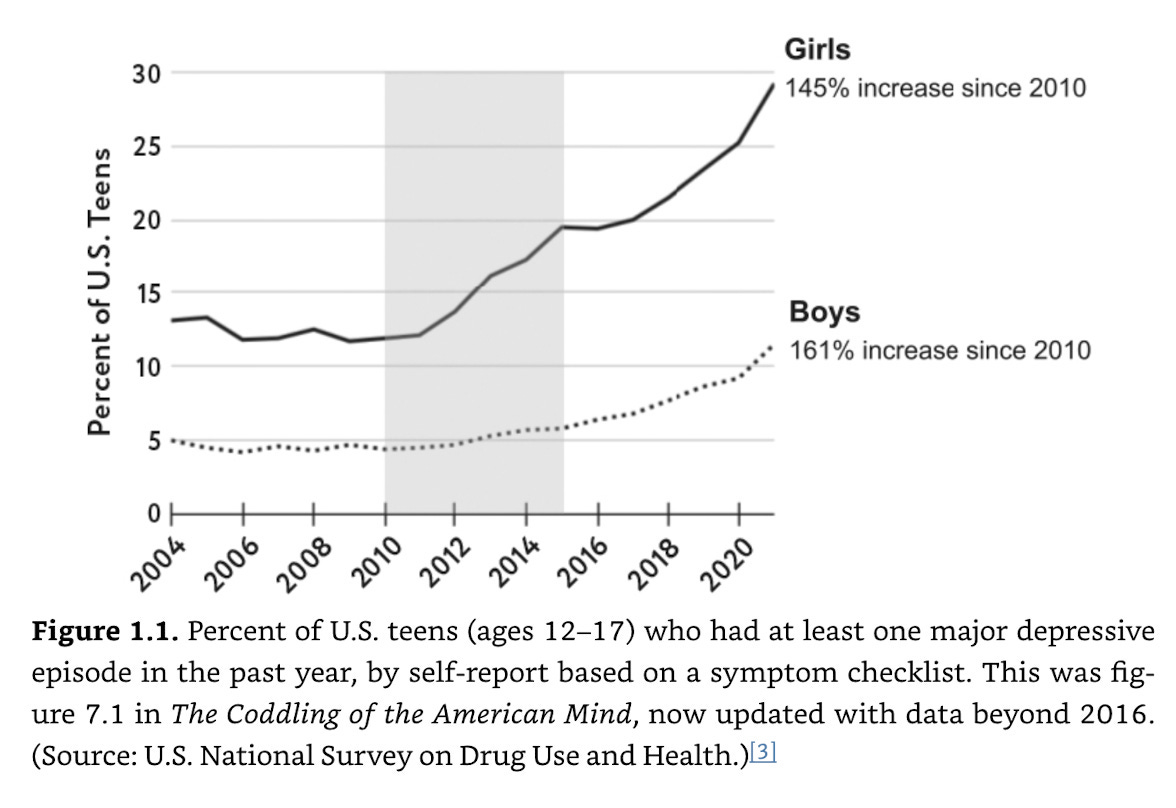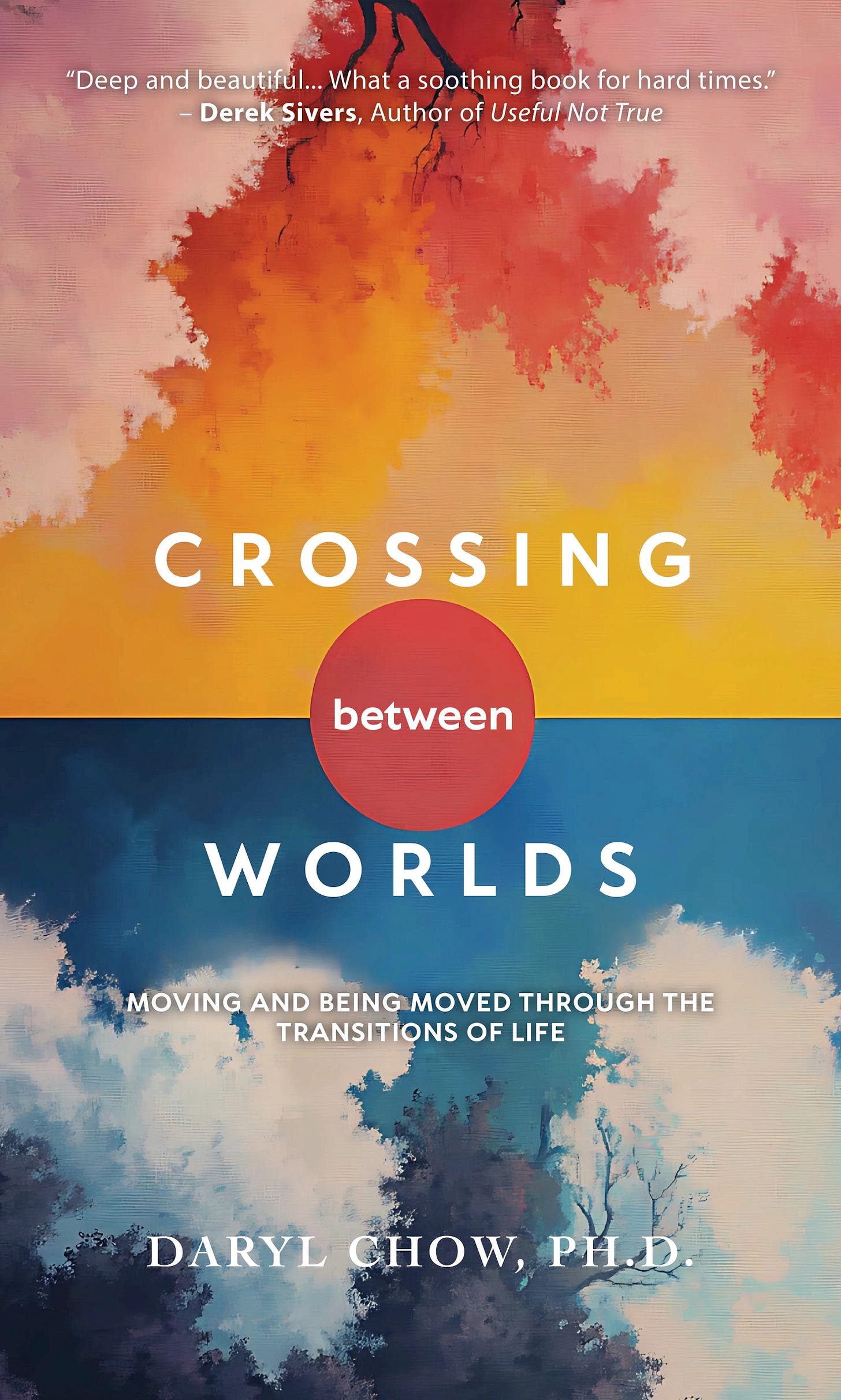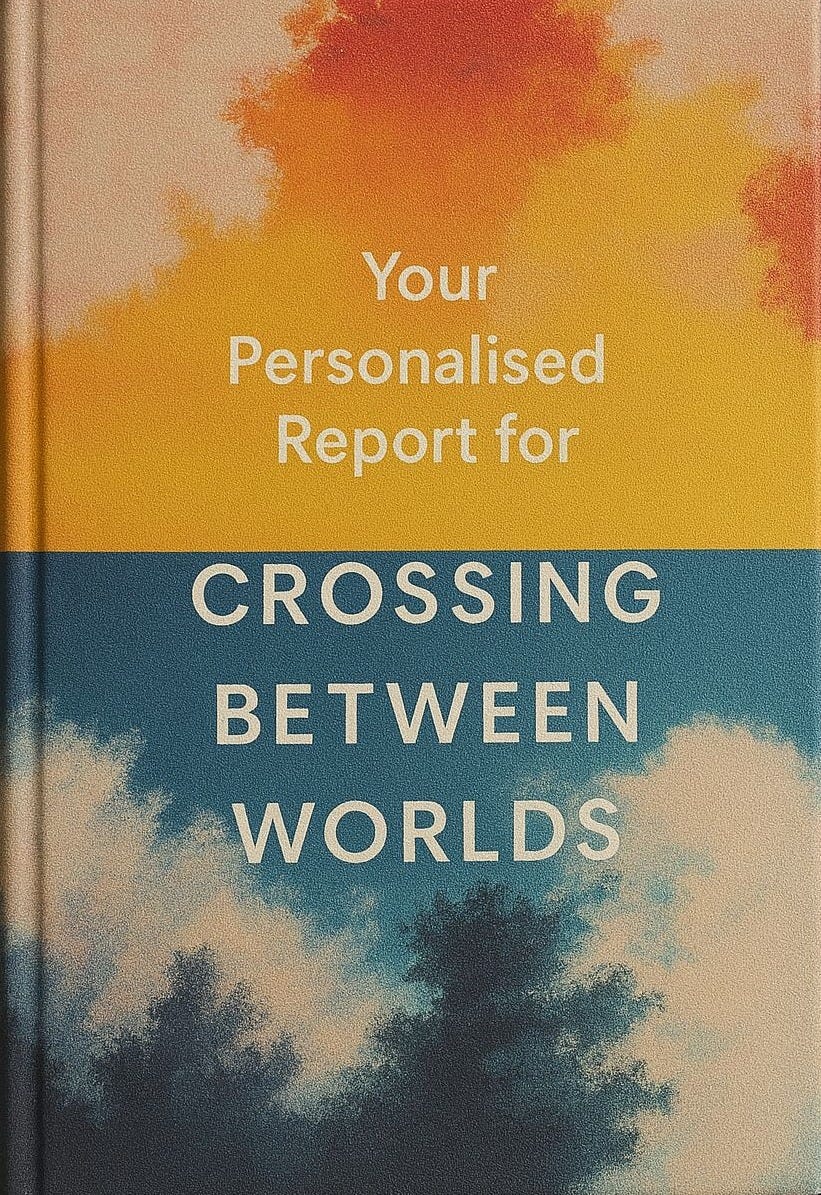Crossing Between Worlds
For those navigating significant life transitions... protect yourself from value capture.
Thanks for reading Full Circles: Meditations on the Inner and Outer Life. If you are new here, learn about me, and the About Page.
These posts are meant to be what Lewis Hyde describes as a “Gift.” What this “Gift” concept means for me is that
Nothing is expected out of you.
I hope you receive it.
I hope this animates you.
I hope you spread the love to others.
In the next couple of Full Circles releases, I will be sharing with you excerpts from the upcoming book, Crossing Between Worlds: Moving and Being Moved Through the Transitions of Life.
Merry Christmas to you and loved ones.
See you on the other side.
“You enter the forest at the darkest point, where there is no path.
Where there is a way or a path, it is someone else’s path. You are not on your own path.
If you follow someone else’s way, you are not going to realise your potential.”
— Joseph Campbell1
This is for people who are Crossing Between Worlds.
People who have been struck by losses, changes, realisations, significant hurts, or a “waking up” to the reality of this mortal coil, people who would leave an old world behind, even though the new world is fraught with uncertainty and there’s no guarantee that it will all work out. You could be in your mid-forties, facing your third life-transition after losing a parent and experiencing a career change; or you could be in your second year of university, facing your first legitimate crossroads in love, experiencing betrayal, and asking “what the heck do I do with my life?” type of question.
In other words, this book is for people who are making changes on the outside and on the inside, inching into a new season of life.
The impetus for embarking on a path of Crossing Between Worlds might stem from one of the following: Losing a job, the death of a loved one, being struck by an illness, an intractable addiction, a relationship breakup, burnout from a lifeless career, a betrayal, mustering the courage to leave an abusive relationship, a divorce. Sometimes, life just likes to throw a bunch of these challenges at us all at once. And it’s not just negative stuff. The urge to create a new life can come from stepping out of high school, getting married, the birth of your first child, moving countries, a new career opportunity, beginning a new life project after a reexamination of core existential priorities.
For some, the motivation for change could be the painful realisation that they have been an asshole for a long time. They have had enough of their own attitude. Their conscience is banging on their door. For others, a repeated pattern of others taking advantage of their kindness makes them realise they can no longer be conflict-avoidant. Resentment is eating them from the inside out.
How Tech Is Trapping Us Between Worlds
And then there are those who realise they're currently wasting their life, even though they didn't start off that way. Our technological devices—especially the mobile phone—have insidiously not only messed up our attention span, but have also strayed from our original intentions for them. They’re more than just distractions. Tech companies call us “Users'' for a reason: We are all addicts in our dopamine-drenched culture.
Our youth are paying an especially high price. Anxiety, depression, self-harm, and suicide rates among the young, especially girls, have increased dramatically since the period of 2010–2015. Social psychologist Jonathan Haidt notes in his 2024 book, Anxious Generation, that this was the period of the great rewiring of our children that we never consented to.
But what in the world happened between 2010 and 2015 that led to a proliferation of mental health concerns?
In 2010, Apple introduced the iPhone 4, the first smartphone with a front-facing camera. Promptly, Samsung followed suit. “That same year, Instagram was created as an app that could be used only on smartphones,” says Haidt. He adds,
For the first few years, there was no way to use it on a desktop or laptop. Instagram had a small user base until 2012, when it was purchased by Facebook. Its user base then grew rapidly (from 10 million near the end of 2011 to 90 million by early 2013). We might therefore say that the smartphone and selfie-based social media ecosystem that we know today emerged in 2012, with Facebook’s purchase of Instagram following the introduction of the front-facing camera. By 2012, many teen girls would have felt that ‘everyone’ was getting a smartphone and an Instagram account, and everyone was comparing themselves with everyone else. Over the next few years the social media ecosystem became even more enticing with the introduction of ever more powerful “filters” and editing software within Instagram and via external apps such as Facetune. Whether she used filters or not, the reflection each girl saw in the mirror got less and less attractive relative to the girls she saw on her phone. While girls’ social lives moved onto social media platforms, boys burrowed deeper into the virtual world as they engaged in a variety of digital activities, particularly immersive online multiplayer video games, YouTube, Reddit, and hardcore pornography—all of which became available anytime, anywhere, for free, right on their smartphones.
SEE RELATED:
Essentially, a play-based childhood has been replaced by a phone-based childhood. Social media is the new toy that everyone seems to love and hate at the same time. No other theories seem to explain this decline in mental health among the young (especially given the timing), including economic crises, climate change, academic pressure, an increase in self-reporting, and the age-old admonition of the proverbial statistics professor who says “correlation is not causation.”2
Just to be clear, this is not a Luddite-attack on every form of modern technology. I’m a fan of great inventions, and we are beneficiaries of these tools in so many ways. The discovery of fire marked a significant turning point that shaped human evolution. But like fire, if we do not learn to control technology we risk being consumed by its power. If we continue to be passive users and don’t actively discern what’s best for us all, we might burn the house down.
We have to ask ourselves: What is the ultimate price we are willing to pay for a culture of junkies on their phones, waiting for the next dopamine hit?
Value Capture

Vietnamese philosopher C. Thi Nyugen rightly names the issue that is happening in our culture “Value Capture.” In his paper of the same title, he notes,
“…It is rather difficult to say, in a principled way, exactly why value capture is so horrifying. For one thing, value capture is often consensual.”
Nyugen adds,
“In value capture, we outsource the process of value deliberation.”
In other words, we allow our core values to be overruled by quantifiable metrics. We might have begun by caring about things like good health, developing skills and expertise, or a job we love. But increasingly, with the nudge of technology, our values and goals become co-opted by what the machine values. Think FitBit. Nyugen says,
Even if fitness was your main goal, the FitBit can exert a narrowing influence. Exercise can be valuable in all sorts of ways that aren’t measured by a FitBit. A FitBit doesn’t capture the ecstasy of complex skillful motion. It doesn’t capture the camaraderie of team sports, the meditative calm of paddling a canoe across a quiet lake, or the aesthetic loveliness of a delicate rock climbing move. A FitBit measures exactly one thing: Steps.
SEE RELATED:
Listen to an interview with C. Thi Nguyen or read the full transcript.
Nyugen, an avid gamer himself, had a lightbulb moment when he heard a well-known speaker give a talk at a conference. The German game-designer made the following remark:
“The most important thing in my toolbox is the point system... [because] it tells the person what to desire.”
Nyugen told an interviewer,
“This is what I’m worried about. It changes what we desire.”
What has all of this got to do with making transitions in your life? My hope through this book is to advocate for you to follow your deep desires, and not let your progress be stymied by meaningless, shallow desires. I think you and I can agree that there are many distractions going around. Think about the last time you were about to do something useful for yourself and got sucked into the ether on your little device. When your attention gets co-opted, it messes with your intentions. The last thing I want for you is to give up on your deep desires because you got lost in the infinite scroll of TikTok.
Desire is a life-force that has the potential to bring more life. Desire is a seed planted within you, and it’s your job to not only nourish and raise it to life, but also protect it from Value Capture.
Stay tuned for more excerpts and counterintuitive ideas from Crossing Between Worlds.
Crossing Between Worlds is now available in all good bookstores.
P/S: Complete a short quiz to get a comprehensive How-To guide, to help you make significant life transitions and changes.
Thanks for reading Full Circles: Meditations on the Inner and Outer Life. Subscribe for free to receive new posts and support my work.
Daryl Chow Ph.D. is the author of The First Kiss, co-author of Better Results, and The Write to Recovery, Creating Impact, and the new book The Field Guide to Better Results .
If you are a helping professional, you might like my other Substack, Frontiers of Psychotherapist Development (FPD).
From Joseph Campbell, A Joseph Campbell Companion: Reflections on the Art of Living.
For more on why other competing explanations fall short, read Jean Twenge’s article: afterbabel.com/p/13-explanations-mental-health-crisis.










Looking forward to reading your book Daryl. Happy holidays!